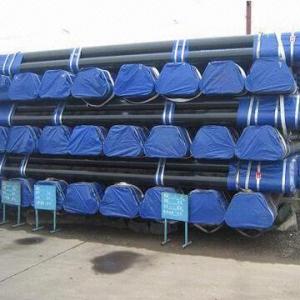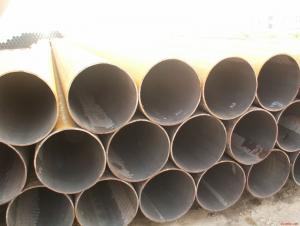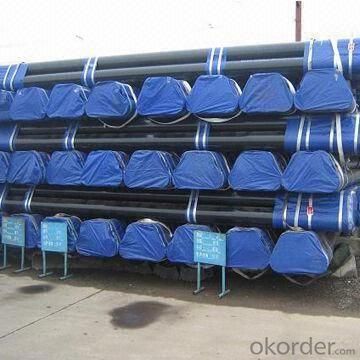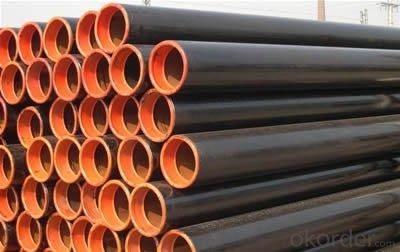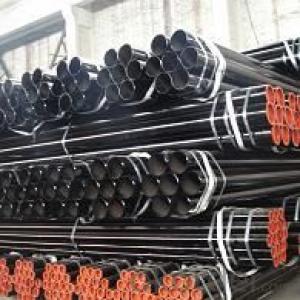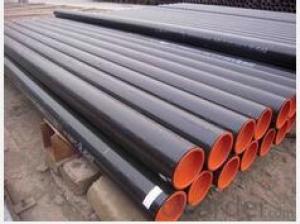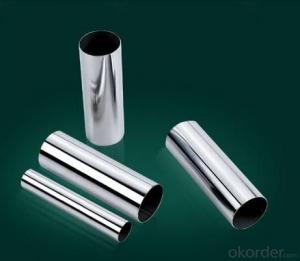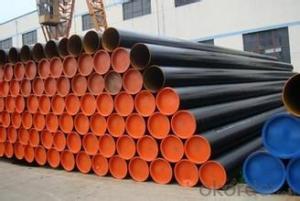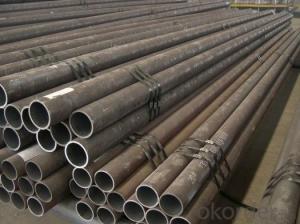Seamless Steel Tubes For Petroleum Cracking
- Loading Port:
- China Main Port
- Payment Terms:
- TT or LC
- Min Order Qty:
- 20mt m.t.
- Supply Capability:
- 5000 Tons Per Month m.t./month
OKorder Service Pledge
OKorder Financial Service
You Might Also Like
Standards and Application of Seamless Steel Tubes For Petroleum Cracking
DIN2391:Seamless Precision Steel Tubes for mechanical and automotive engineering.
EN10305-1:Seamless Steel Tubes for precision applications.
DIN17175:Seamless Tubes of Heat resistant Steels used in Boilers, Pressure vessels & equipment for service upto 600° C and at high pressures.
ASTM A106/SA106:Seamless Carbon Steel Pipes for High - Temperature Service.
ASTM A179/SA179:Seamless Cold-Drawn Low-Carbon Steel tubes for Heat-Exchanger and Condenser.
ASTM A192/SA192:Seamless Carbon Steel Boiler Tubes for High-Pressure Service.
ASTM A210/SA210:Seamless Medium-Carbon Steel Tubes for Boiler and Super heater.
Request a Supplier Assessment Report of Seamless Steel Tubes For Petroleum Cracking
You can either send the default request below or compose your own request to the supplier.
Usages of Seamless Steel Tubes For Petroleum Cracking
It can be used for transmitting a large number of fluid. Such as oil, natural gas, water and some solid materials. At the same time it can be widely used as the manufacture of various structural parts and mechanical parts,as well as building construction.
Package of Seamless Steel Tubes For Petroleum Cracking
Packaging/Delivery Wrapped in bundles with steel strips or according to customers' requirements.
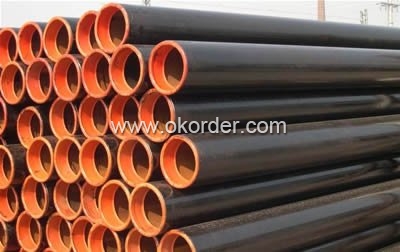
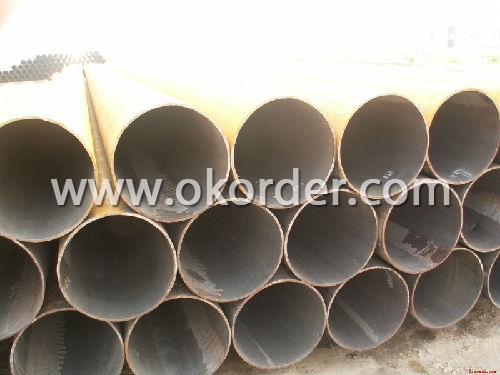
- Q: How do you determine the pipe schedule for steel pipes?
- Several factors, including pressure rating, wall thickness, and outer diameter, are taken into account to determine the pipe schedule for steel pipes. The pipe schedule serves as a standardized system that classifies the thickness of pipe walls, ensuring compatibility and safety in various applications. To ascertain the pipe schedule for steel pipes, one must consider the maximum pressure the pipe will endure, typically measured in pounds per square inch (psi) or bars. The pressure rating indicates the pipe's ability to withstand pressure without experiencing failure or leakage. Higher pressure ratings necessitate thicker pipe walls. Another crucial factor in determining the pipe schedule is the wall thickness, typically expressed in inches or millimeters. The wall thickness directly correlates with the pressure rating, as thicker walls have the capacity to handle higher pressures. The American National Standards Institute (ANSI) has established a set of standardized wall thicknesses for steel pipes known as the "pipe schedule." The outer diameter of the pipe is also taken into consideration when determining the pipe schedule. The specific application and requirements influence the outer diameter variation. Selecting a pipe with the appropriate outer diameter is essential to ensure proper fit and compatibility with fittings, valves, and other components. In conclusion, the pipe schedule for steel pipes is determined by examining the maximum pressure, wall thickness, and outer diameter. By aligning these factors with the suitable pipe schedule, one can guarantee that the steel pipe is appropriate for its intended usage and capable of withstanding the required pressure.
- Q: What is the difference between hot dip galvanized steel pipe and galvanized steel pipe?
- 1, the process is different, one is chemical treatment, one is physical treatment; hot-dip galvanized coating is reliable, not easy to fall off2, hot-dip galvanized coating thickness, so strong corrosion resistance. And zinc plating (electroplating) coating evenly, surface quality is better, coating thickness is generally between a few microns to more than ten microns.3 hot galvanizing is a chemical process, which belongs to electrochemical reaction. Zinc plating is a physical treatment, just brush a layer of zinc on the surface, there is no galvanizing inside, so the zinc layer is easy to fall off. Hot-dip galvanizing is used in building construction.4 、 hot galvanized pipe is to make molten metal and iron matrix reaction and produce alloy layer, so that the substrate and coating two combination.
- Q: What are the industries that commonly use steel pipes?
- Some of the industries that commonly use steel pipes include construction, oil and gas, water and wastewater treatment, mining, manufacturing, automotive, and infrastructure development.
- Q: What are the advantages of using steel pipes in industrial plants?
- There are several advantages of using steel pipes in industrial plants. Firstly, steel pipes are known for their exceptional strength and durability. They can withstand high temperatures, pressure, and heavy loads, making them ideal for transporting various materials and fluids within industrial facilities. Secondly, steel pipes have excellent resistance to corrosion. This is particularly important in industrial settings where the pipes come into contact with corrosive substances or are exposed to harsh environmental conditions. The corrosion resistance of steel pipes ensures their longevity and helps to prevent leaks, which can be costly and hazardous. Additionally, steel pipes offer a high level of versatility. They can be easily fabricated and customized to meet specific requirements, such as different sizes and shapes. This flexibility allows for easier installation and maintenance, reducing downtime and improving overall efficiency in industrial plants. Moreover, steel pipes have a smooth interior surface, which offers several advantages. It allows for efficient flow of materials, minimizing resistance and pressure drop. This smoothness also makes steel pipes less prone to accumulating deposits and contaminants, ensuring a clean and hygienic environment. Furthermore, steel pipes are highly resistant to fire. In industrial plants, where fires can have catastrophic consequences, the fire resistance of steel pipes provides an added layer of safety. Lastly, steel pipes are cost-effective in the long run. Although their initial installation cost may be higher compared to other materials, such as plastic or copper, their durability and low maintenance requirements result in significant cost savings over time. Steel pipes have a long lifespan, reducing the need for frequent replacements or repairs, and their resistance to corrosion and other damages also contributes to cost reduction. In conclusion, the advantages of using steel pipes in industrial plants include their strength, durability, corrosion resistance, versatility, efficient flow, fire resistance, and cost-effectiveness. These qualities make steel pipes a reliable and efficient choice for various applications within industrial facilities.
- Q: What is the role of steel pipes in the aerospace industry?
- Steel pipes play a crucial role in the aerospace industry as they are used in various applications such as aircraft manufacturing, engine components, and fuel systems. These pipes are known for their high strength, durability, and resistance to extreme temperatures and pressure. They provide a reliable conduit for fluids, gases, and hydraulic systems, ensuring efficient operations and safety in aircraft. Additionally, steel pipes are utilized in structural components like landing gear, frames, and support structures due to their ability to withstand heavy loads and maintain structural integrity under dynamic conditions. Overall, steel pipes are essential in the aerospace industry for their versatility and reliability in critical systems and structures.
- Q: Are steel pipes suitable for wastewater pumping stations?
- Indeed, steel pipes prove to be a fitting option for wastewater pumping stations. Renowned for their endurance and robustness, steel pipes excel in handling the challenging conditions and high-pressure demands within these stations. They possess the capacity to withstand the corrosive properties of wastewater while resisting harm caused by chemicals and other aggressive substances commonly present in such environments. Furthermore, steel pipes are accessible in a variety of sizes and thicknesses, enabling customization to fulfill the specific requirements of each pumping station. Moreover, the ability to easily weld and connect steel pipes ensures a secure and leak-proof system. In conclusion, steel pipes provide a dependable and enduring solution for wastewater pumping stations.
- Q: What is the weight of hot galvanized steel tubes? DN150 4mm wall thickness
- GB/T3091-2008: DN150 welded steel pipe, wall thickness of 6mm, the theory of the weight of welded steel pipe 24.02kg/m, galvanized steel pipe should be multiplied by the weight coefficient after galvanizing, C, DN150, wall thickness of 6mm, C=1.02, DN150, theoretical weight and wall thickness of 6mm galvanized steel 1.02*24.02= 24.5kg/m.
- Q: How are steel pipes used in the electronics industry?
- Steel pipes are commonly used in the electronics industry for various purposes such as cable management, structural support, and conduit systems. They provide a strong and durable solution for organizing and protecting electrical wires and cables. Additionally, steel pipes are utilized in the construction of electronic equipment enclosures and racks, ensuring stability and efficient cooling.
- Q: Can steel pipes be used in marine environments?
- Yes, steel pipes can be used in marine environments. Steel is a commonly used material in marine structures due to its strength, durability, and resistance to corrosion. However, it is important to use the appropriate grade of steel and apply protective coatings to enhance its resistance to seawater corrosion. Regular maintenance and inspections are also necessary to ensure the longevity and performance of steel pipes in marine environments.
- Q: How are steel pipes used in the manufacturing of geothermal systems?
- Steel pipes are used in the manufacturing of geothermal systems for their durability and heat conductivity. They are used to transport fluids, such as water or steam, between the geothermal source and the heat pump or power generator. Steel pipes can withstand high temperatures and pressures, making them ideal for the harsh environment of geothermal systems. Additionally, their corrosion resistance ensures the longevity and efficiency of the system.
1. Manufacturer Overview
| Location | Wuxi, China |
| Year Established | 1991 |
| Annual Output Value | 300,000Tons |
| Main Markets | Europe; Southeast Asia; etc. |
| Company Certifications | API 5L;API 5CT;API Q1;ISO/TS29001 |
2. Manufacturer Certificates
| a) Certification Name | |
| Range | |
| Reference | |
| Validity Period |
3. Manufacturer Capability
| a) Trade Capacity | |
| Nearest Port | Wuxi; Shanghai |
| Export Percentage | 41% - 50% |
| No.of Employees in Trade Department | 3900-4000 People |
| Language Spoken: | English; Chinese; Spanish |
| b) Factory Information | |
| Factory Size: | Above 450,000 square meters |
| No. of Production Lines | Above 10 |
| Contract Manufacturing | OEM Service Offered;Design Service Offered |
| Product Price Range | Average |
Send your message to us
Seamless Steel Tubes For Petroleum Cracking
- Loading Port:
- China Main Port
- Payment Terms:
- TT or LC
- Min Order Qty:
- 20mt m.t.
- Supply Capability:
- 5000 Tons Per Month m.t./month
OKorder Service Pledge
OKorder Financial Service
Similar products
Hot products
Hot Searches
Related keywords
